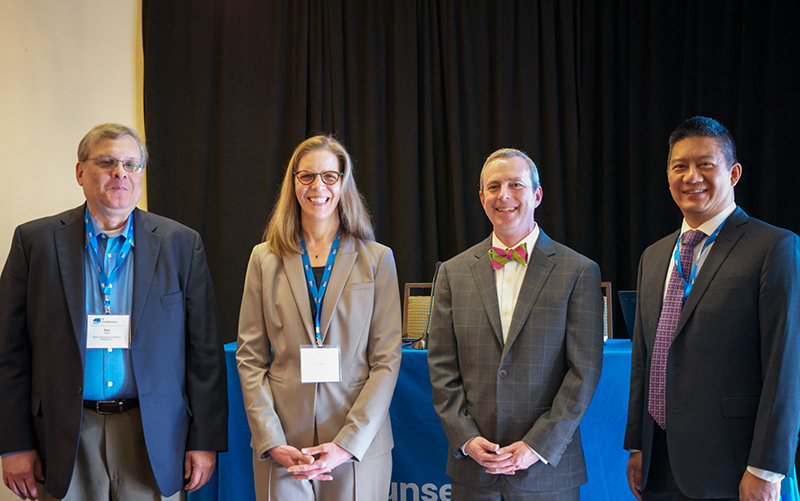Biopharma supply chains, streamlining regulation, and other critical issues came up when the leader of the U.S. agency regulating drugs spoke with the leader of the U.S. association representing biopharma drug makers at the world’s largest biotech conference.
Biotechnology Innovation Organization (BIO) President and CEO John F. Crowley shared a lively onstage exchange with U.S. Food and Drug Administration (FDA) Commissioner Dr. Robert Califf, M.D., at the BIO International Convention in San Diego on June 5. Below are highlights.
Biopharma supply chains
“We saw what happens when we don’t have resilient supply chains in the United States during a pandemic,” said Crowley. “I spend a lot of time with Congress talking about how do we remedy this. Because I do think the BIOSECURE Act is more than anything a wake-up call on manufacturing that we need to redomicile much of the supply chain across the spectrum in the United States, and with our allies, and to ensure global availability of medicines.”
Dr, Califf agreed it is a concern that a large proportion of drug manufacturing takes place in China. “It’s so concentrated that it puts us at risk and we have to do something about it because if something goes wrong with the relationship with China, we’d be cut off completely,” he said.
Dr. Calif said onshoring is important, and “friend-shoring,” or working with countries that are geographically and politically close to the U.S. can also help. He added that offshoring will still be a part of the equation, especially in places like India.
The FDA is focusing on increasing inspections in India to help ensure that those manufacturers meet U.S. quality standards, he said. “We’re really stepping up our focus on inspections in India because that is the biggest player in the market where we’re seeing issues,” he explained. “India has been supportive of that because it’s in their long-term national interest.”
The need for greater regulatory coordination
Crowley noted the importance of better coordination among regulatory agencies for BIO members. Dr. Califf acknowledged the challenge and described continuing efforts.
“We just reached agreement with the Agriculture Department on genetically engineered animal issues and intentional genomic alterations,” Dr. Califf said, referring to the May 1 Memorandum of Understanding with the U.S. Department of Agriculture. “We have a good system now where I think we’re going to be able to move quickly when the risk is low.”
He also spoke of efforts to harmonize with international regulators, something Crowley said is important for BIO members. Dr. Califf said progress is being made to allow approval in one country’s regulatory system translate to other countries.
“If you’re producing a good data set for good stuff, there’s no reason to have to be submitting that to all the players in different ways, and if we could agree on the study design,” it can facilitate faster drug approval and access around the world, he said.
The state of America’s health

“If we look at the world as a whole, life expectancy is rising very nicely. The number of children dying from infectious diseases is continuing to drop substantially,” even in lower-income countries, Dr. Califf said. “High-income countries are also doing better, except for one: the United States. We’re flat or declining now for almost a decade. And this is being driven by a combination of common chronic disease where we have a much higher disease burden than other countries: diabetes, obesity, cardiovascular disease—and diseases of despair: suicide, drug overdose, gun violence.”
Dr. Califf noted that certain populations have particularly low life expectancy, including Native American and Native Alaskan populations, African American men, and men from Appalachia in the South. The solutions are greater health equity through improved access to primary care, greater awareness, and better prevention, he said.
Crowley agreed: “It’s been argued, of course, by many that we don’t have a healthcare system in the United States, we have a disease care system, because insurance by and large does not pay for preventative healthcare, preventative medicines.”
Clinical trial diversity and streamlining
Crowley asked about efforts targeting greater diversity in clinical trials. Dr. Califf said improvements are being made, but noted that trial design can’t do everything to achieve equity.
“We’re asking in the United States for a clinical trial system to overcome the health system, which is fundamentally inequitable,” Dr. Califf said.
They also discussed ways to streamline clinical trials.
“One of our core missions at BIO is to work with you and with the ecosystem to find a way ahead, to modernize the clinical trial paradigm, to help elevate regulatory science together with all the wonderful medical and scientific capabilities that we have,” Crowley said. He asked what can be done to “bring more certainty to clinical trials—stop with some elements of redundancy and make it more efficient while maintaining the gold standard of safety and efficacy.”
Dr. Califf spoke of technological improvements that can enhance efficiency.
“I think what we’re going to see is increasing use of digital information, including information collected from the person at home, in a way that gives more clear results. Maybe even with larger populations, but much less cost,” he said.
Accelerated approval
Crowley noted the importance of the Accelerated Approval pathway for enabling access to cures for rare diseases. Although the pathway has done so much good and “was life-changing for people in the HIV crisis,” it has come under fire.
“I don’t know of anybody in FDA who thinks that the basics of Accelerated Approval should be changed,” said Dr. Califf. One area where there may be some improvements is in the post-market studies done to confirm the efficacy of a drug that has been granted Accelerated Approval.
Crowley said the industry accepts the need for confirmatory studies. “Sometimes we have to acknowledge we are going to make mistakes,” he said. He noted that a drug that received Accelerated Approval for amyotrophic lateral sclerosis (ALS) was responsibly pulled after a confirmatory study failed.
“When they withdrew their drug from the market, it was the right thing to do and I think speaks to, you know, the degree of moral authority. It’s an example of exactly what we together need to be prepared to do,” Crowley said.



